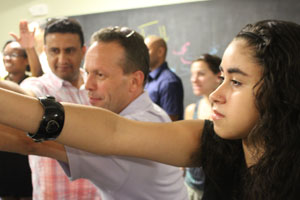
26 teachers from 9 countries of the Middle East and Africa participated in cultural exchange at the Armory July 12. - Photo by Erin Jenkins
By Andrew Firestone
The Armory hosted a mission of peace this last Tuesday, July 12, when 26 teachers from across North Africa and the Middle East arrived to participate in a teaching exercise with Teen Empowerment as part of their month-long odyssey through the University of the Middle East Project. Begun 11 years ago, the Teacher Education Institute at the UME has been bringing an exchange of information and culture between the U.S. and the Middle East, and this month, the teachers embarked on an exploration through what it means in the west to be an educator in the twenty-first century.
“One thing is an emphasis on critical thinking,” said program Director Ray Matsumiya, whose work with the project spans back to 1997. “There’s so much information out there now. Everyone has access to information, so that’s just not what’s valuable anymore. What’s valuable is able to take that information, synthesize it, and then do something with it. All innovation comes from things like that.”
Matsumiya says that the program originally had doctors and masters students among others, but that they decided that secondary education (high school to us) was the most important stage to try to reach. “It’s something that’s cross-cutting through almost everything. It goes through the economy. It goes through the society,” said Matsumiya of education.
“It focuses on young people,” he added. “They are the ones who are impressionable, and they are the ones who are going to be making the change in the future.”
Among other skills practiced were civic engagement and use of technology. “No one is in a box anymore because of the worldwide economies and the Internet everything seems to be interconnected,” said Matsumiya. “You kind of have to learn how to work with different cultures.”
Perhaps it was this emphasis on civic engagement that made Teen Empowerment a fitting choice for working with the teachers. “One of the major reasons of why we wanted our teachers to work with the teens at Teen Empowerment is that they are a great example of kids that they teach, really going out in doing something,” said Matsumiya. Rep. Denise Provost of Somerville also joined the group.
“The University of the Middle East project does excellent work in bringing people across national boundaries to learn from each other,” said Provost, who also hosted the group at the Statehouse. “The Teacher Education Institute, which UME has run every summer for the last 11 years, has this year brought 26 educators from nine counties in the Middle East and North Africa to the US to learn from each other, and from us, and to form relationships that will continue to be beneficial to all,” she said.
Next week, the group heads to Washington D.C. where they will finish their program and present their findings to a representative from the Bureau of Educational and Cultural Affairs, a faction of the State Department that funds the UME. “Every year it gets incrementally bigger,” Matsumiya said of the project. He said that they go home to a large network in their region, which helps them implement the new teaching methodologies they have learned.
The UME also sends educators over to the Middle East, and finds the exchange there is just as profound. “I think they’re equally inspiring,” he said of the two regions and their impact upon educators, “especially from the Middle East side, because Americans go over there and see what limited resources these countries have and yet they are doing such amazing things.”
The UME has also changed the make-up of Somerville, as well in it’s own way. Last May, a delegation from Tiznit, Morocco arrived in Somerville to affirm their status as a Sister City, which was approved by the King of Morocco. The relationship began when teacher Samira Idelcadi returned from the UME U.S. program, and ended up making a huge splash. She wand her new teaching methods, which included youth civic involvement, were so positively received that the Mayor of Tiznit asked her to run for City Council on his ticket, which she went on to win.
In this way, said Matsumiya, does the UME project hope to gradually bind the two regions together. While he is not sure of the ultimate destination of his project, he hopes that these kinds of relations are only a hint of what is to come in the future.

















Reader Comments